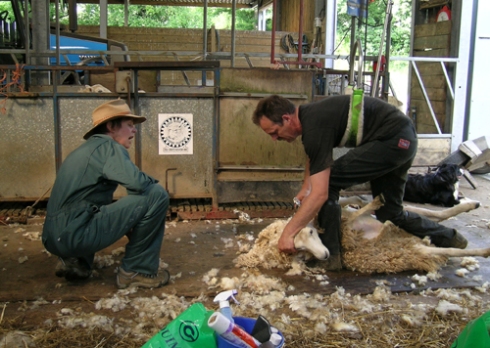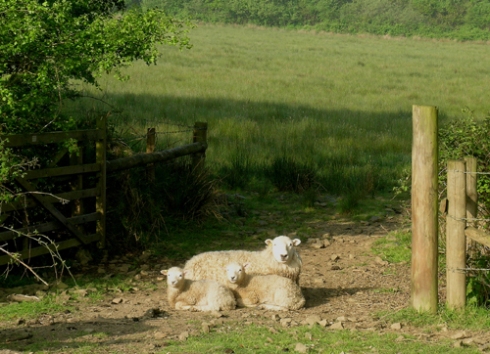‘Anything I need to know. Any messages?’ I shout-
‘What’s that…can’t hear you?’
‘Messages, any messages I need to know? Anything?’
‘Na…nothing really’
‘Have you heard from Simon’
‘Who?’
‘Simon, Simon the shearer, Simon Cooper?’
‘Oh yeah, could’ve. Some geezer left a message, couldn’t really make sense of it. Oh hang about, some woman left a message too…about shearing tomorrow maybe?’
‘You didn’t put them off did you? Did you say we wouldn’t be back?’ the phone sneezes and fades…
‘What?’
‘You didn’t say ‘no’?’ I shouted
‘No‘ he yelled back
Sounds like we could be shearing tomorrow. I need things. Wool sheets (huge tarpaulin sacks, called ‘sheets’ for storing fleeces when sheep are being sheared), vetrazin (a pyrethrum-based pour-on against fly strike which I use on the lambs as they are not shorn until the end of August – Soil Association approved). It’s Saturday evening, how on earth am I going to organize things for tomorrow? The phone crackles into life again…
‘Hey Oll, can you give me Simon’s number?’
‘Uhh, yes…and mum, wool lady called said she doesn’t want wool this year but has your green sacks’
Last year a friend of mine and her colleague managed to obtain a grant through the Dartmoor National Park to start up a business using wool from Whiteface Dartmoor Sheep (and other local Dartmoor/Devon breeds) to make felted burial shrouds working with the Natural Fibre mill at Launceston and the old carpet mills at Buckfastleigh. It’s still in its infancy.
‘That’s great!’
‘What, about her not having the wool?’
‘No, no…she’s got my wool sheets!’ the phone burbles and swishes as if under water
‘Mum’ Olly voice splutters back ‘I said green sacks…’
‘Yeah, yeah I got that – they’re called sheets. When did she call? Can you get me her number too…what, what?’ Damn phone, goes again ‘Hello, hello – hi Oll? Oh hi, no, it’s on my database; yup that’s it, on the computer. Click on her name in customer info. Yes, that’s it, great’
This was wonderful news; I might be able to get my sheets by tomorrow (I use green sheets as my wool is organic).
‘Oll, how are the sheep by the way?’ the phone returns to a few moments of normal reception-
‘I think okay. The old girl with mastitis, her udder’s fallen off at last’(in sheep with ‘black bag’, a type of highly toxic mastitis, the udder turns black and eventually sloughs off – if the sheep survives) ‘but I’m just not sure ‘bout fly-strike…I think they’re okay. Not really sure though’ It had been perfect weather for fly-strike, warm and humid.
‘Okay don’t worry, I’ll check them first thing in the morning. And thanks for all the great work looking after the farm. Byee. Hang on, hey, hang on a second Robert’s just saying something…Oll, he’s not around tomorrow – can you get back to give me a hand? You can? Fantastic, see you tomorrow then and have a good evening!’
This exchange took place on the M5 near Bristol, on the way back from our holiday in Scotland. Our home land line stopped working as soon as we left the farm to go north and a week later BT hadn’t yet fixed the fault – a real problem as we have very limited mobile reception on the farm and the same was true of Scotland. We’d been exchanging broken conversations and text during the week. And reception wasn’t much better now; our voices crackled and popped in and out of hearing. Olly had been looking after the farm for the week and was catching up with us before having an evening off surfing and meeting friends.
The car became a mini office, holiday flying out of the window. Phone Simon; confirm we’re on for tomorrow. Ring Yuli about the wool sheets and to ask if she can possibly get them to the farm for tomorrow, she can! Get hold of Sal and see if she has any spare vetrazin. No, but my neighbours have. All this with bad reception and trying to explain that no-one can get hold of us at home as the phone’s not working!
Sunday dawns, I’m up early to check the sheep before I bring them up. I find one ewe with fly-strike. She’d tried her best to rub it out but couldn’t as her fleece was ‘tied’ (due to the wet winter, longwool fleeces become ‘tied’ – matted and felted into a solid lump – rather the same as long-haired cats and dogs). Luckily she’s not too bad.
Get pens ready, gather sheep and walk the mile and half home up the lane. It’s very hot and humid, they don’t want to move, sticking to every bit of shade, panting and exhausted. Simon arrives. He’s a wonderful laid back sort of guy, fantastic with sheep; can look at a pen full of moving, dithering animals and tell you exactly how many there are! Try counting a field of sheep next time you pass one – I tell you, it’s not easy. We begin; it’s hot, itchy, scratchy, back breaking work. Simon pours sweat; I’ve the easier job, rolling fleeces. At last it’s done; ewes look as if made of lustrous, rose-white moiré silk, gleaming in the afternoon sun. Lambs call and shout not recognising their new-look mums. Rams rear high and crash horns clashingly in new found exuberance. We walk the sheep to Rushy Meadow – hoggs leap and bounce in energetic high spirits; ewes sink down into the grass forming peaceful, pastoral pools of tranquillity with reunited lambs. We hang over the gate in the setting sun, tired, dirty, weary but satisfied. And trudge back up the lane quietly murmuring – ‘proper job’ and ‘glad that’s done, needed it, poor buggers’ ‘not a day too early’ as we clear up the yard ready for the next big job tomorrow – mucking out the cow palace!




5 comments
Comments feed for this article
June 20, 2007 at 9:48 pm
Sara
I have had a go at sheep shearing and the professionals make it look easy.
Sara from farmingfriends
June 21, 2007 at 6:38 am
paula
Completely agree with you. During foot and mouth I had to shear all the sheep and lambs. It took me hours…I think the best I managed was 14 a day! I have total admiration Simon and couldn’t do without him.
June 23, 2007 at 5:11 pm
Erin Gill
Paula, I loved your description of the sheep in this posting! How exciting that Olly is wanting to farm! Does this mean you’ll be able to get away from the farm more often – perhaps a weekend in our area of West Wales?
June 25, 2007 at 7:43 am
paula
It’s incredibly exciting! I hope it all works out and after a year Olly still feels the same. And yes, yes, yes, I certainly hope it gives me time away from the farm – and to visit West Wales!
July 1, 2007 at 1:59 am
jeanette
we have 5000 acres and 2000 sheep our woes and highs are exactly the same our flies are triple and our foe meet us at every turn. what was a joyous but hard way of life but an incouraged way to clear the land and feed and clothe the people is today as if we are at war and we are having to constantly justify our existance.in the wetter parts of west australia the smaller farmer were forced out to grow trees.